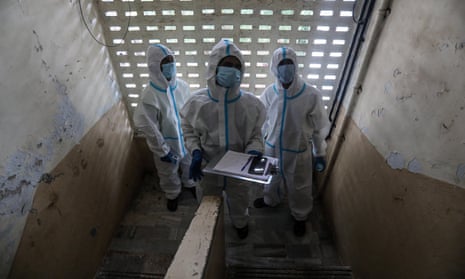We’ve launched a new blog at the link below – head there for the latest:
WHO reports worrying infection trends in southern Europe and Balkans – as it happened
US has highest number of cases, followed by Brazil and India; Trump urges people to wear masks; number of confirmed cases worldwide passes 15 million. This blog is now closed – follow our live coverage below
Wed 22 Jul 2020 19.29 EDT
First published on Tue 21 Jul 2020 19.24 EDT- Summary
- US daily coronavirus deaths surpass 1,000 for first time since June
- Global coronavirus cases pass 15 million
- Africa’s confirmed Covid-19 cases exceed 750,000 - Reuters tally
- Australia to post biggest budget deficit since second world war
- WHO: worrying infection trends in southern Europe and Balkan region
- Summary
- Global cases pass 14.9m
- Australia reports record one-day case rise
- Australian state of Victoria reports record-one day case rise
- China reports 14 new cases including nine from Xinjiang
- Zimbabwe introduces curfew
- Trump admits pandemic will 'get worse' at first Covid-19 briefing in months
- California cases set to overtake New York's
- China's Sinovac vaccine becomes third worldwide to enter Phase 3 clinical trial
- Trump urges Americans to wear masks
- Summary

Live feed
- Summary
- US daily coronavirus deaths surpass 1,000 for first time since June
- Global coronavirus cases pass 15 million
- Africa’s confirmed Covid-19 cases exceed 750,000 - Reuters tally
- Australia to post biggest budget deficit since second world war
- WHO: worrying infection trends in southern Europe and Balkan region
- Summary
- Global cases pass 14.9m
- Australia reports record one-day case rise
- Australian state of Victoria reports record-one day case rise
- China reports 14 new cases including nine from Xinjiang
- Zimbabwe introduces curfew
- Trump admits pandemic will 'get worse' at first Covid-19 briefing in months
- California cases set to overtake New York's
- China's Sinovac vaccine becomes third worldwide to enter Phase 3 clinical trial
- Trump urges Americans to wear masks
- Summary

There was an “astonishing” failure by government to plan for the economic impact of a possible flu-like pandemic, parliament’s financial watchdog has said.
MPs on the cross-party public accounts committee concluded that government schemes were drawn up “on the hoof” in mid-March by Rishi Sunak’s Treasury, weeks after the first case of coronavirus was detected in the UK. The delay risked leaving sectors of the UK economy behind, according to a report published on Thursday:
Hi, Helen Sullivan joining you now. I’ll be bringing you the latest for the next few hours. Get in touch on Twitter @helenrsullivan.
The US president Donald Trump has claimed to be comfortable with his son Barron and his grandchildren going back to school, arguing that schools should be open despite concerns from many that it could lead to more infections.
Trump also urged young people to avoid packed bars and to take other steps to limit the spread of the virus.
The US state of California has recorded its highest number of new cases in a single day, as the state surpasses New York for the greatest total of cases in the country.
The state saw 12,807 confirmed cases on Tuesday, the governor, Gavin Newsom, announced on Wednesday. That figure brings the state’s total to more than 413,576 since the pandemic began, Newsom announced.
Israeli lawmakers have empowered the country’s government to order anti-coronavirus curbs with limited parliamentary oversight, stirring opposition fears for the country’s democratic health, Reuters reports.
After early success, the prime minister Benjamin Netanyahu has been struggling with resurgent contagions. Sporadic closures of various sectors of the economy have deepened public vexation, sparking daily demonstrations.
By a vote of 48-35, the Knesset ratified a “Grand Corona Law” that would allow the government to impose restrictions it deems urgent – such as a threatened new lockdown – with lawmakers reviewing such decisions only after 24 hours.
Other anti-coronavirus measures not deemed urgent by the government would go into effect only after a Knesset review.
Bolivia’s plan to hold elections in September is increasingly in doubt amid rising coronavirus deaths, and reports that police have recovered the bodies of hundreds of suspected Covid-19 victims.
In the past five days, a special police unit had found 420 bodies in streets, vehicles and homes in the capital, La Paz, and in Bolivia’s biggest city, Santa Cruz, authorities said on Tuesday. Between 80% and 90% of them are believed to have had the virus.
Elections scheduled for September were seen as a key step in stabilising Bolivia’s democracy after a year of political tumult that reached its peak in November when Evo Morales was forced to resign as president by the military.
But, this week, a committee that advises the health ministry on outbreak containment measures said in a letter to the country’s top election official that holding the elections as scheduled would not be advisable because of the rapid spread of the virus.
In Scotland, Edinburgh’s Hogmanay traditional street festival has been called off and tickets have been withdrawn. A statement from organisers Underbelly said:
It is clear to all parties that the famous street party cannot take place in its current form in 2020 and tickets are today being taken off sale. Customers who have booked tickets will be contacted in the next 14 days to be offered a full refund.
An announcement on the 2020-21 Edinburgh’s Hogmanay programme will take place towards the end of August.
Tickets had been on sale since 1 January and it was previously said talks about the event were positive.
Summary
Here are the key developments from the last few hours:
- Global cases passed 15m. The number of coronavirus cases worldwide passed 15m on Wednesday, according to the Johns Hopkins University tracker, which relies on official government data. Known coronavirus deaths number 617,832.
- US daily coronavirus deaths surpass 1,000 for first time since June. The seven-day average for the number of deaths in the country has been slowly rising this month, according to multiple data analyses, and went past the 1,000 mark on Tuesday, taking US fatalities to more than 142,000.
- Australia to post biggest budget deficit since second world war. The government that went to the last federal election declaring it was “back in black” will on Thursday unveil the largest budget deficit since the second world war, reflecting the substantial fiscal support rolled out during the pandemic and a decline in revenue because of a contraction in activity.
- Africa’s confirmed Covid-19 cases exceed 750,000 - Reuters tally. The tally showed the continent had 751,151 cases, 15,721 deaths and 407,461 recoveries. Cases crossed the 500,000 mark on 8 July.
- Female leaders have been better at tackling Covid-19, says ECB chief. The differences in policies and communication were “quite stunning” in countries led by women, said the European Central Bank chief Christine Lagarde.
- US agrees to pay Pfizer $2bn for Covid-19 vaccine doses by end of year. The Trump administration will pay Pfizer nearly $2bn for a December delivery of 100m doses of a Covid-19 vaccine the pharmaceutical company is developing. The agreement is part of a plan to ramp up manufacturing in the event a vaccine is approved.

The UK government’s flagship test-and-trace system is failing to contact thousands of people in areas with the highest infection rates in England, raising further questions about the £10bn programme described by Boris Johnson as “world-beating”.
Local leaders and directors of public health are demanding more control over the tracing operation amid concerns that their ability to contain the virus is being put at risk.
Data obtained by the Guardian shows that in areas with the highest infection rates in England, the proportion of close contacts of infected people being reached is far below 80%, the level the government’s scientific advisers say is required for test and trace to be effective.
Aritana Yawalapiti, one of Brazil’s most influential indigenous leaders, has arrived at a hospital in the central city of Goiânia early on Wednesday to be treated at an intensive care unit after an arduous journey over rural roads with a dwindling supply of oxygen, Reuters reports.
The hospitalisation of Aritana, who is around 70 years old and leads the people of the Upper Xingu in central Brazil, is a powerful symbol of the threat to vulnerable indigenous communities in Brazil.
He came down with symptoms in recent days and initially declined to leave his village in a remote part of the state of Mato Grosso, according to Celso Correia Batista, who aids indigenous people. However, as his condition deteriorated and he needed oxygen to breathe, Aritana agreed to go to hospital, Batista said.
Aritana and Batista set off on a 10-hour drive to a hospital in the small city of Canarana, in Mato Grosso. After performing a lung scan, they began looking for ways to get him to an ICU, but were unable to find a doctor willing to transport him by air. As a result, they decided on a risky nine-hour car journey to Goiânia.
Batista said they traveled with four 1,000-liter oxygen cylinders during the trip – two of which were “practically empty” – to keep the chief alive until he reached the hospital. On the way, Batista said, the cylinders were replaced by full ones in a quick pit-stop. “Otherwise we would have lost him,” he said.
After arriving in Goiânia at 1.30am (BRT) on Wednesday, Aritana had to wait 30 minutes outside the hospital as he had not traveled with any documents. “His condition is serious, but he has every chance of survival,” said Batista.